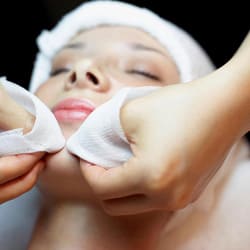Acne Treatments That Work

No doubt you have tried a lot of things to clear up your acne. You have probably been to the dermatologist, spent hours talking with people in white coats at department stores, and spent lots of money trying on products in the aisles of the department stores.
Acne is a chronic, inflammatory skin condition that causes spots and pimples, especially on the face, shoulders, back, neck, chest, and upper arms. Whiteheads, blackheads, pimples, cysts, and nodules are all types of acne. It commonly occurs during puberty, when the sebaceous glands activate, but it can occur at any age. It is not dangerous, but it can leave scars. The glands produce oil and are stimulated by male hormones produced by the adrenal glands in both males and females. Risk factors include genetics, the menstrual cycle, anxiety, stress, diet, hot and humid climates, using oil-based makeup, and squeezing pimples.
Acne Causes
Human skin has pores that connect to oil glands under the skin. Follicles connect the glands to the pores. Follicles are small sacs that produce and secrete liquid. The glands produce an oily liquid called sebum. Sebum carries dead skin cells through the follicles to the surface of the skin. A small hair grows through the follicle out of the skin. Pimples grow when these follicles get blocked, and oil builds up under the skin. Skin cells, sebum, and hair can clump together into a plug. This plug gets infected with bacteria, and swelling results. A pimple starts to develop when the plug begins to break down. Propionibacterium acnes (P. acnes) is the name of the bacteria that live on the skin and contributes to the infection of pimples. Research suggests that the severity and frequency of acne depend on the strain of bacteria. Not all acne bacteria trigger pimples. One strain helps to keep the skin pimple-free.
Consult An Acne Specialist
Treatment depends on how severe and persistent the acne is.
Just like other treatments, acne facials are not a one-time deal. You will have to commit to a series of regular acne treatments with a specialized esthetician in order to see results. Facial treatment frequency may differ from one person to another. Some may require weekly facials, and others may need bi-weekly or monthly acne facial treatments. Consult with your acne skin care specialist.
However, since you are reading this, I’m betting nothing has worked. Is there anything that does? Yes, but it isn’t a magic pill, magic cream or magic potion. It is a process, and one that works best if you have the help of an acne specialist. It has a 95% success rate. Unlike some products that work for a period of time and then stop, this process keeps working and keeps your skin clear.